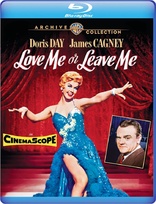Love Me or Leave Me Blu-ray Movie
HomeLove Me or Leave Me Blu-ray Movie 
Warner Archive CollectionWarner Bros. | 1955 | 122 min | Not rated | Sep 13, 2016
Movie rating
7.5 | / 10 |
Blu-ray rating
| Users | 4.7 | |
| Reviewer | 3.5 | |
| Overall | 3.5 |
Overview
Love Me or Leave Me (1955)
A fictionalized account of the career of jazz singer Ruth Etting and her tempestuous marriage to gangster Marty Snyder, who helped propel her to stardom.
Starring: Doris Day, James Cagney, Cameron Mitchell, Robert Keith, Tom Tully (I)Director: Charles Vidor
| Romance | Uncertain |
| Drama | Uncertain |
| Biography | Uncertain |
| Music | Uncertain |
Specifications
Video
Video codec: MPEG-4 AVC
Video resolution: 1080p
Aspect ratio: 2.55:1
Original aspect ratio: 2.55:1
Audio
English: DTS-HD Master Audio 5.0 (48kHz, 24-bit)
Subtitles
English SDH
Discs
50GB Blu-ray Disc
Single disc (1 BD)
Playback
Region free
Review
Rating summary
| Movie | 3.0 | |
| Video | 4.5 | |
| Audio | 4.5 | |
| Extras | 2.5 | |
| Overall | 3.5 |
Love Me or Leave Me Blu-ray Movie Review
How to Get Ahead in Show Business
Reviewed by Michael Reuben September 14, 2016The name of Ruth Etting has faded from popular memory, but in the first half of the last century,
Etting was a famous singer, recording artist and (briefly) film actress. Love Me or Leave Me is a
heavily fictionalized bio-pic of Etting, named after one of her hit songs. The 1955 MGM
production is notable for its pairing of Doris Day as Etting with James Cagney as the Chicago
hoodlum who becomes her manager and, later, husband. Cagney, of course, was an old hand at
playing gangsters, but Day's turn as Etting was a departure for an actress known and admired for
her wholesome image. In the screenplay by Daniel Fuchs (The
Underneath) and Isobel Lennart
(Anchors Aweigh), Etting is an amoral
opportunist who drinks, wears revealing costumes and
marries a man she doesn't love for the sake of her career. Day would later reveal that she
hesitated before taking the role and, after the film appeared, she received angry letters from
outraged fans. One can only imagine the intensity of the reaction if the strictures of the Hays
Code had not forced cuts like the removal of a rape scene that Day later wrote was "one of the
most fully realized physical scenes I have ever played".
The Warner Archive Collection is adding Love Me or Leave Me to its expanding Blu-ray
collection of musicals from the MGM library.
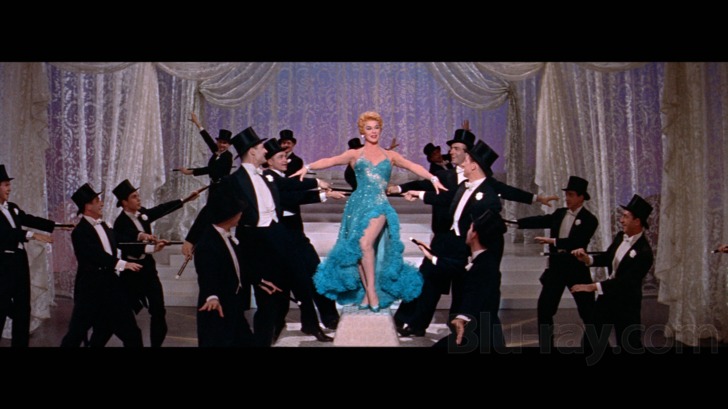
An opening title informs us that we're in 1920s Chicago. Ruth Etting (Day) is working in the stable of "Ten Cents a Dance" girls at a local club (although the real Ruth Etting denied that she ever held such a job). There she is spotted by the two men who will become life-long rivals for her affection.
Johnny Alderman (Cameron Mitchell) is a piano player, who offers to coach Ruth's singing but clearly has ulterior motives. Marty Snyder (Cagney) is a local gangster known as "the Gimp" because of his pronounced limp. Marty runs a laundry service as a protection racket, forcing club and restaurant owners to pay for more clean napkins and tablecloths than they can use, and he's used to getting what he wants, including any woman who catches his eye. But Ruth refuses Marty, and Day's carefully calibrated performance leaves you guessing whether she has scruples or is simply playing coy. Whichever it may be (and it's quite possibly both), Marty is hooked and throws himself into fulfilling Ruth's dreams of stardom with the same manic intensity that the pugnacious hustler brings to every situation. He appoints himself her manager, hires Johnny as her music teacher and browbeats club owners into booking her. When it turns out that Ruth really can sing, her career takes off, but she still holds Marty at arm's length, even after she reluctantly consents to marry him.
Love Me or Leave Me has two basic plot strands, and it alternates between them with the mechanical regularity of a ticking metronome. One consists of Doris Day's performance of numerous Etting standards, plus two new songs written for the film, usually in complete renditions designed to showcase her considerable vocal talents. (She's a better singer than Etting, at least judging by the examples included in the Blu-ray extras.) The other plot strand charts the gradual deterioration in the mercenary relationship between Ruth and Marty. As Ruth climbs the show business ladder, progressing from Chicago headliner to Ziegfeld Follies star to recording and radio artist and, finally, to a movie contract, Marty's bullying tactics become increasingly grating and inappropriate. They're also far less effective once Marty leaves the small pond of Chicago for the shark-infested oceans of New York and Hollywood. Musical directors and studio executives aren't so easily intimidated, and they have their own hired muscle to protect them, for which Marty's faithful attendant, Georgie (Harry Bellaver), is no match.
Cagney had already played numerous gangsters, but his Marty is a unique creation, because he is able to show you the frustration and self-doubt gnawing away at the former kingpin's bravado. Marty's insecurities emerge in angry eruptions that are initially directed against Ruth and then, when he realizes she has fallen in love with Johnny, at the man he once considered merely a hired hand. Eventually, Marty's fury will erupt in violence, as it did in real life.
Audiences of the Fifties weren't yet ready for a musical with a downbeat ending, and director Charles Vidor (Hans Christian Andersen) stages a semblance of a reconciliation that's surprisingly effective. As Ruth sings the title song at the opening night of a swanky Hollywood nightclub into which Marty has poured his heart and soul and all of his money, her soon-to-be-ex-husband sits near the back, smiling and savoring the gorgeous notes emanating from the stage. Somehow there's still a connection between the couple, and the music acts as a salve for the accumulated bitterness and hurt. In life, Ruth Etting retired from performing, married Johnny and lived quietly for the next forty years, never seeing Marty (or "Moe", his real name) again.
Love Me or Leave Me Blu-ray Movie, Video Quality 

Love Me or Leave Me was shot in Cinemascope, one of the spate of widescreen formats with which studios experimented in the Fifties to entice viewers away from their TV sets and back to movie theaters. The cinematographer was Arthur E. Arling, an Oscar winner for The Yearling, whose expert lighting produced a rich, detailed and colorful image from the problematic lenses of early Cinemascope. For this 1080p, AVC-encoded Blu-ray, the Warner Archive Collection was fortunate enough to have an interpositive that was made from the original camera negative before significant fading set in. A 2K scan of the IP has been meticulously color-corrected to bring out the full spectrum of vivid hues on display in Doris Day's musical performances, for which the storied MGM costume department worked up one lavish gown after another. Men's formalwear is solidly black—no blue tuxedos here!—and the image is remarkably sharp and detailed, given the notorious softening that is a hallmark of early Cinemascope. The film's grain texture is natural and finely resolved so that, in motion, it is barely noticeable unless you are looking for it. WAC has mastered the film at its usual target bitrate of just under 35 Mbps.
Love Me or Leave Me Blu-ray Movie, Audio Quality 
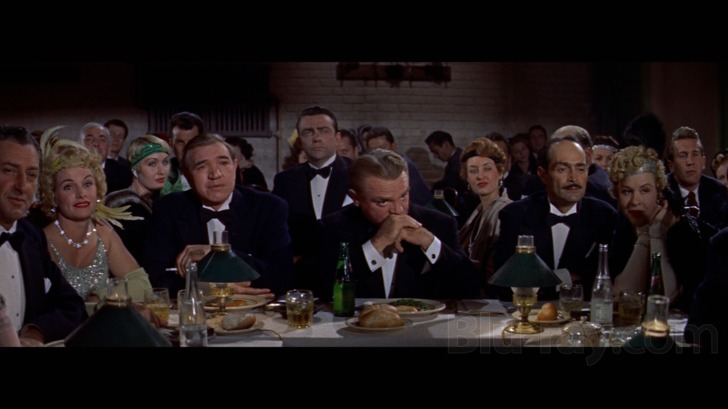
Love Me or Leave Me's 5.0 soundtrack, encoded in lossless DTS-HD MA, has been taken from the original pre-recording masters containing music, dialogue and effects, which were remixed using the original magnetic four-track mix as a guide. The result has good fidelity and wide dynamic range, rendering both the instruments and Doris Day's singing voice with notable clarity and without distortion or interference. The dialogue is always clear, which is a tribute not only to the mix but also to James Cagney's ability to enunciate every syllable no matter how rapidly Marty Snyder talks (and fast-talking is an essential part of his technique). There's no credit for original music, but MGM stalwarts George Stoll and Robert Van Eps reportedly contributed incidental cues. At Doris Day's insistence, legendary conductor Percy Faith was brought on to arrange and conduct her songs, which include "My Blue Heaven" and "You Made Me Love You".
Love Me or Leave Me Blu-ray Movie, Special Features and Extras 
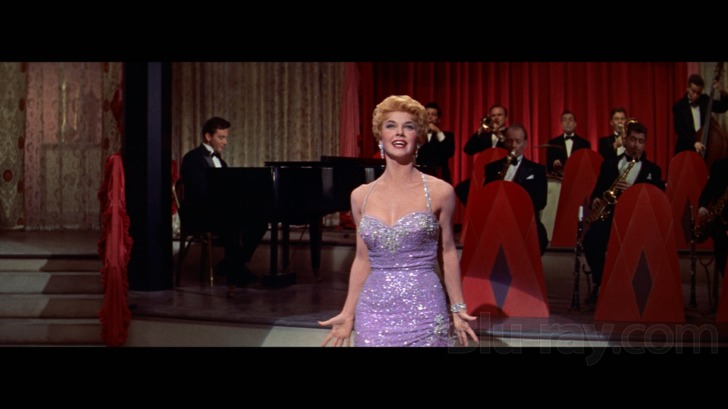
Warner previously released Love Me or Leave Me on DVD in 2005, both as a single disc and as
part of The Doris Day Collection. WAC has ported over the extras from that release, remastering
all of them in 1080p.
- A Modern Cinderella (1080p; 1.37:1; 17:24): This 1932 Vitaphone short stars Ruth Etting as the daughter of an Italian costume shop owner, for whom a case of mistaken identity turns into a chance to sing and a ride in a limo.
- Roseland (1080p; 1.37:1; 12:11): In this 1930 Vitaphone short, Etting plays an aspiring singer who enters a radio contest hosted by the famous Manhattan dance hall of the title.
- Salute to the Theaters (1080p; 2.55:1; 17:09): This 1955 MGM promotional short is expressly aimed at theater owners. Shot in Cinemascope and hosted by actor George Murphy, it offers a preview of coming attractions, including a behind-the-scenes visit to the set of Love Me or Leave Me.
- Trailer (1080p; 2.55:1; 3:26): "The Singing Sweetheart of the Roaring Twenties! Portrayed by the Singing Sweetheart of Today!"
Love Me or Leave Me Blu-ray Movie, Overall Score and Recommendation 
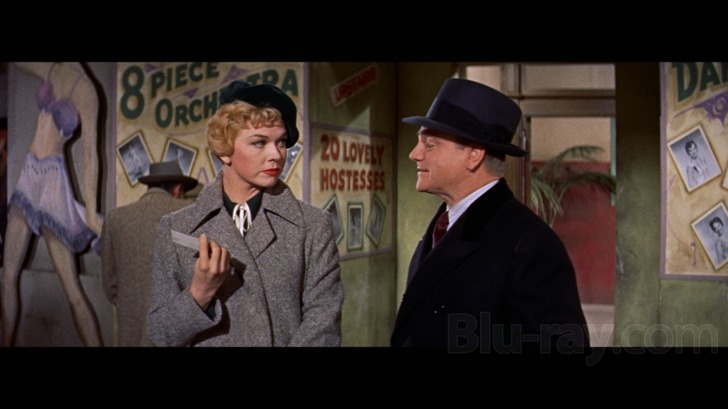
It's hard to understand how Love Me or Leave Me managed to win the 1955 Oscar for "Best
Motion Picture Story" (a category later subsumed in "Best Original Screenplay"), especially
since the competition included Rebel Without a
Cause. Maybe the voters were impressed with the writers' ability to suggest much of what couldn't be said directly about the morally dubious
relationship at the film's core, in which Ruth exploits Marty's carnal hunger to further her career
(and pays a high price for the bargain). If musicals were still a viable option for the studios,
Etting's life would be well worth revisiting in an R-rated bio-pic that could address the sexual
bargain directly. But who could ever equal the performances by Day and Cagney? Stars of that
caliber belong to a bygone era, and they're the reason to see Love Me or Leave Me today. WAC's
presentation is excellent and highly recommended.
Similar titles
Similar titles you might also like

Young Man with a Horn
Young Man of Music / Warner Archive Collection
1950

Nothing in Common
1986

A Star Is Born
1954

The Best of Everything
Limited Edition to 3000
1959

A Star Is Born
2018

Why Be Good?
Warner Archive Collection
1929

Picnic
Limited Edition to 3000 - SOLD OUT
1955

A Star Is Born
Restored Edition | Warner Archive Collection
1937

Sadie McKee
Warner Archive Collection
1934

A Summer Place
Warner Archive Collection
1959

Beloved Infidel
Limited Edition to 3000 - SOLD OUT
1959

The Way We Were 4K
50th Anniversary
1973

Brooklyn
2015

Some Came Running
Warner Archive Collection
1958

Ziegfeld Girl
Warner Archive Collection
1941

Written on the Wind
1956

The Jazz Singer
1927

Begin Again
2013

The Miracle Woman
1931

Footloose 4K
40th Anniversary Edition
1984
